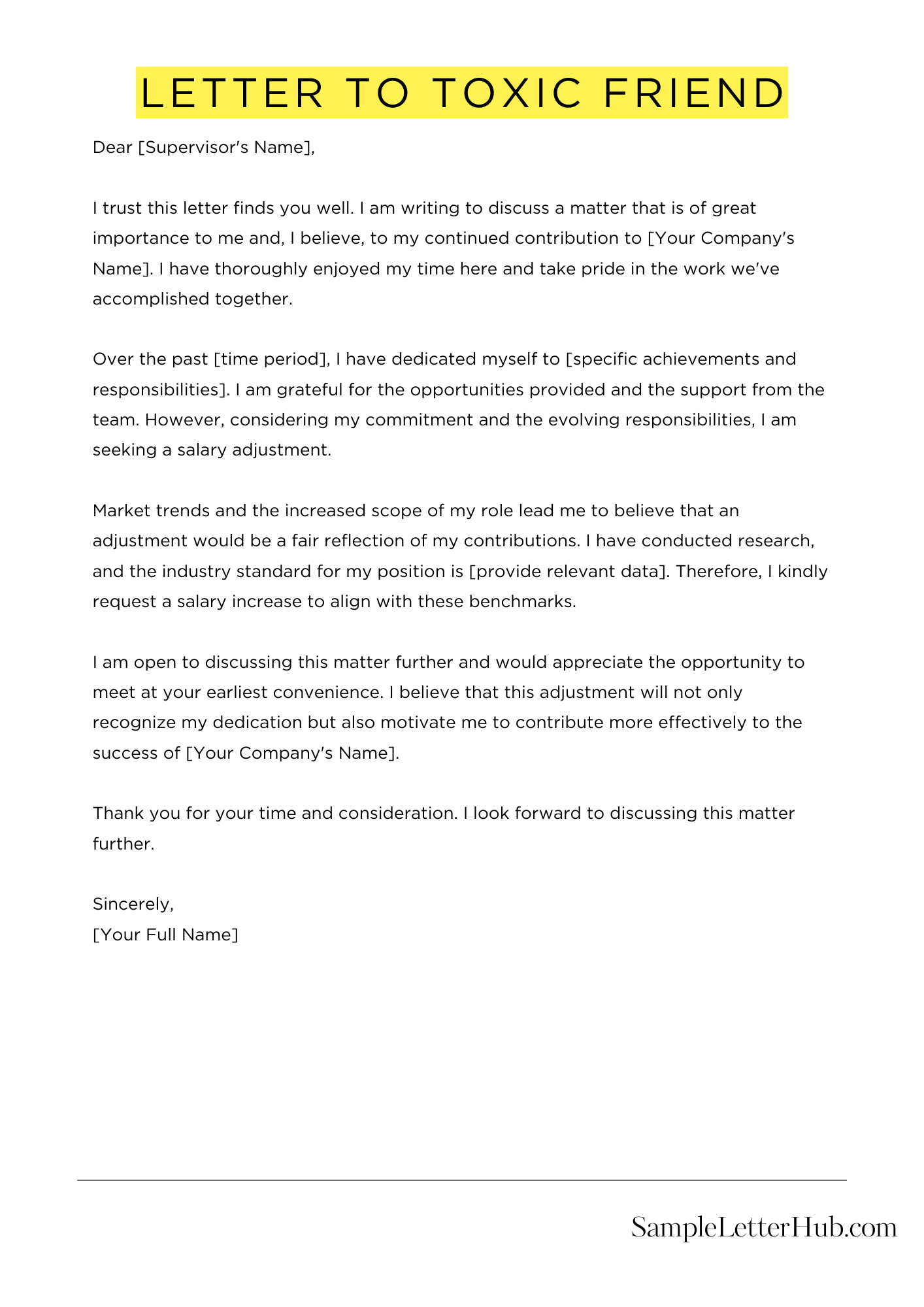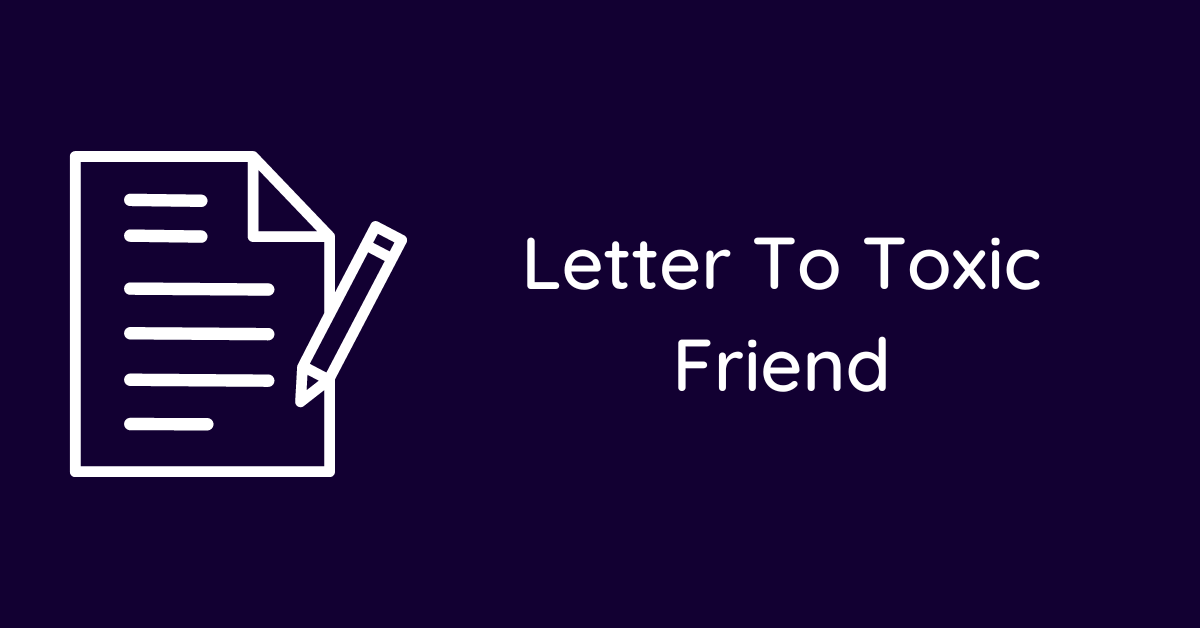Letter To Toxic Friend is a letter that you write to a friend who is toxic to you. The purpose of this letter is to express your feelings about their behavior and to set boundaries.
We will share templates, examples, and samples of Letter To Toxic Friend. These letters are written by professionals and can be used as a starting point for your own letter.
You can use these letters to express your feelings, set boundaries, and protect yourself from further harm.
Breaking the Cycle: A Letter to a Toxic Friend
Dear [Friend’s name],
I hope this letter finds you well. I’ve been thinking about our friendship lately, and I’ve come to a difficult realization. I’ve decided that it’s best for me to take some space from our relationship.
Over the past few months, I’ve noticed a pattern in our interactions. You often make me feel belittled, criticized, and undervalued. Your words and actions have left me feeling drained and insecure.
I understand that everyone has flaws, and I’m not perfect either. But the constant negativity and criticism have taken a toll on me. I’ve tried to communicate my feelings to you, but it hasn’t seemed to make a difference.
I value the time we’ve spent together, but I can’t continue to be in a relationship that’s causing me so much pain. I need to prioritize my own well-being.
I’m not trying to blame you or make you feel bad. I simply want to explain my decision and set clear boundaries. I hope you can understand and respect my choice.
I wish you all the best in the future.
Sincerely,
[Your name]

How to Write a Letter to a Toxic Friend
Writing a letter to a toxic friend can be a difficult task. You may be feeling angry, hurt, or betrayed. You may not know what to say or how to say it. However, it is important to remember that you have a right to express your feelings. A well-written letter can help you to do this in a clear and concise way.
1. Start with a Salutation
The salutation is the first part of your letter. It should be formal and respectful, even if you are writing to someone who has hurt you. For example, you could write “Dear [Friend’s Name].”
2. State Your Purpose
The first paragraph of your letter should state your purpose for writing. Be clear and direct. For example, you could write “I am writing to you today to express my concerns about our friendship.” This will help your friend to understand what the letter is about and why you are writing it.
3. Provide Specific Examples
In the body of your letter, provide specific examples of your friend’s toxic behavior. Be as detailed as possible. For example, you could write “I am concerned about the way you always put me down in front of other people. This makes me feel embarrassed and humiliated.” Avoid using generalizations or accusations. Instead, focus on specific behaviors that you have observed.
4. Express Your Feelings
Once you have provided specific examples, take some time to express your feelings. Be honest and open about how your friend’s behavior has affected you. For example, you could write “I feel hurt and betrayed when you put me down in front of other people. I feel like I can’t trust you anymore.” It is important to be respectful of your friend’s feelings, but you also need to be honest about your own.
5. Set Boundaries
In the final paragraph of your letter, set boundaries with your friend. Let them know what behaviors you will no longer tolerate. For example, you could write “I will no longer tolerate being put down in front of other people. If you continue to do this, I will have to limit my contact with you.” Setting boundaries is important for protecting your own well-being.
6. Offer Forgiveness
If you are able to, offer forgiveness to your friend. This does not mean that you condone their behavior, but it does mean that you are willing to let go of the hurt and anger that they have caused you. Forgiveness can be a difficult process, but it is an important step in moving on from a toxic relationship.
7. Close with a Salutation
The closing salutation should be formal and respectful, even if you are ending the friendship. For example, you could write “Sincerely, [Your Name].”
Writing a letter to a toxic friend can be a difficult task, but it is an important step in protecting your own well-being. By following these tips, you can write a letter that is clear, concise, and respectful.
FAQs about Letter To Toxic Friend
1. How do I start a letter to a toxic friend?
Begin by expressing your concern and the reason for writing. Clearly state that their behavior has been toxic and has negatively impacted your well-being.
2. What should I include in the body of the letter?
Provide specific examples of their toxic behavior, explaining how it has affected you. Use “I” statements to express your feelings and avoid blaming them. Focus on the impact of their actions rather than attacking their character.
3. How do I end the letter?
End the letter on a firm but respectful note. State your boundaries and expectations for the future. If necessary, inform them that you will need some space or distance to protect your well-being.
4. Should I use harsh language or insults?
No. Avoid using harsh language or insults. The goal of the letter is to communicate your concerns and set boundaries, not to engage in a conflict. Maintain a calm and respectful tone throughout the letter.
5. What if they don’t respond or react negatively?
Be prepared for the possibility that they may not respond or may react negatively. Understand that you have done your part by expressing your concerns and setting boundaries. If they choose not to respect your boundaries, it may be necessary to distance yourself further or seek support from others.

